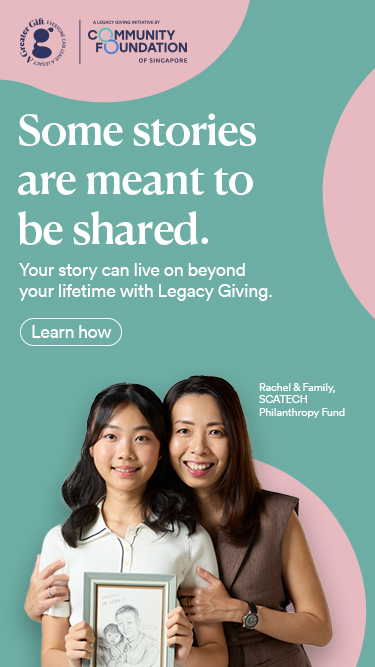The Straits Times – Fund marks 20 years of marriage for couple


About six months before Ms Trina Liang-Lin’s 20th wedding anniversary on June 2016, she mulled over how to make the occasion meaningful.
“My husband and I did not want just another party,” said Ms Liang-Lin, 47, managing director of investment research consulting firm Templebridge Investments.
She is married to Mr Ed Lin, 49, partner and director of the Singapore office of Bain & Company, a global management consultancy.
The couple have no children.
“We wanted to do something meaningful that can last beyond a party,” she added.
Her friend Laurence Lien, chairman of the Community Foundation of Singapore (CFS), suggested she organise regular donations to charity under a common fund, which the foundation could help to run. “We liked the idea. It saves us the work and resources needed to set up a private foundation,” she said.
In early 2016, the Lin Foundation was set up under the umbrella of the CFS with a six-figure sum, she said.
The fund has given money to the Singapore Committee for UN Women, a non-profit organisation that promotes women’s empowerment and gender equality, of which Ms Liang-Lin is the president.
The committee supports the work of UN Women, the United Nations body that promotes gender equality and fights discrimination against women. The fund has also given money to the Singapore Management University, the Singapore Repertory Theatre and the Society for the Prevention of Cruelty to Animals.
These were causes that she picked when the fund was set up.
On more younger, wealthy people like her setting up charity funds, Ms Liang-Lin said: “Increasingly, people are realising that they don’t have to wait till they are older or richer to give back and make an impact.”
Photo: The Straits Times
About six months before Ms Trina Liang-Lin’s 20th wedding anniversary on June 2016, she mulled over how to make the occasion meaningful.
“My husband and I did not want just another party,” said Ms Liang-Lin, 47, managing director of investment research consulting firm Templebridge Investments.
She is married to Mr Ed Lin, 49, partner and director of the Singapore office of Bain & Company, a global management consultancy.
The couple have no children.
“We wanted to do something meaningful that can last beyond a party,” she added.
Her friend Laurence Lien, chairman of the Community Foundation of Singapore (CFS), suggested she organise regular donations to charity under a common fund, which the foundation could help to run. “We liked the idea. It saves us the work and resources needed to set up a private foundation,” she said.
In early 2016, the Lin Foundation was set up under the umbrella of the CFS with a six-figure sum, she said.
The fund has given money to the Singapore Committee for UN Women, a non-profit organisation that promotes women’s empowerment and gender equality, of which Ms Liang-Lin is the president.
The committee supports the work of UN Women, the United Nations body that promotes gender equality and fights discrimination against women. The fund has also given money to the Singapore Management University, the Singapore Repertory Theatre and the Society for the Prevention of Cruelty to Animals.
These were causes that she picked when the fund was set up.
On more younger, wealthy people like her setting up charity funds, Ms Liang-Lin said: “Increasingly, people are realising that they don’t have to wait till they are older or richer to give back and make an impact.”
Photo: The Straits Times
- Related Topics For You: ANIMAL WELFARE, ARTS & HERITAGE, CHARITY STORIES, DONOR STORIES, DONOR-ADVISED FUND, EDUCATION, INCLUSIVITY & INTEGRATION, NEWS, STORIES OF IMPACT



